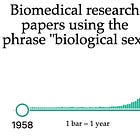"Radical" protests help bring people into the broader movement
disruptive action leads to higher identification with movement-aligned groups perceived as "moderate"

It’s 2025, and public protests are back in the spotlight. Since Donald Trump returned to the presidency in January, Americans have been voicing their opposition more often than they did after Trump’s first inauguration. February 2025 alone saw 2,085 protest events, far outpacing the rate of protest during the same period in 2017.
Demonstrations against authoritarian regimes are not isolated to the US. Serbia saw its largest ever rally this month in opposition to the country’s president after a railway station collapsed and killed 15. Protests have also rocked nearby Hungary (in opposition to county’s autocratic leader and after passage of a law banning Pride marches), Turkey (after the arrest of the presidential challenger and mayor of Istanbul), Georgia (to stave off the ruling party’s embrace of Russia). Just last year, student-led protests in Bangladesh toppled the country’s long-serving prime minister.
Obviously, protests can work at bringing about political change. Just 3.5% of the population is needed to make success possible. Yet, those in power seek to thwart protests by casting demonstrators as radical and disruptive, hoping that non-participants will not want to associate themselves with the larger movement. However, research suggests that this counterstrategy is ineffective.
It’s certainly not that radical acts are never committed by folx for the sake of protest. Indeed, any large-scale movement will have a spectrum of tactics that individual groups employ when taking action.
Take, for example, protests urging action to mitigate climate change: There are many instances of peaceful protest but also radical actions like the two activists who tossed soup at the Mona Lisa. Targeting a beloved piece of art is certainly a more radical approach than a conventional non-violent demonstration (although it should be noted that the Mona Lisa is protected by bulletproof glass and sustained no damage).
Some push back on unconventional and potentially divisive protest tactics in the hopes that doing so will avoid the “radical" label handed down by those in power. However, research on protest efficacy suggests otherwise.
In October 2024, a collaboration between British and American researchers published results in Nature Sustainability on whether more radical protest tactics shift public opinion. To do so, they chose two organizations dedicated to climate justice:
Friends of the Earth which engages the public through conventional political advocacy (signing petitions, public commenting on policies)
Just Stop Oil whose actions are more disruptive, including a November 2022 action which halted traffic flow on London’s M25 motorway
The researchers were informed in advance of Just Stop Oil’s disruptive action on the M25 which allowed them to survey Brits’ opinion on the two organizations before and after the action.
The survey results showed that respondents who were aware of Just Stop Oil’s action were more likely to show increased identification with and support for the more “moderate” Friends of the Earth. Notably, people’s underlying beliefs about climate change were not affected. Instead, respondents were more likely to identify with the movement itself, albeit at the more moderate flank.
To use a sports metaphor, disruptive action encouraged folx to come off of the sidelines. In the sense that Just Stop Oil’s action brought more people into the movement, the M25 action was a success. (Although political action to mitigate climate change remains sparse.)
I was curious whether this effect could be observed in a different realm of political action. So, I pulled up polling numbers on Americans’ views on whether the 2020 election was rigged against Donald Trump (which, to be clear, was not rigged) relative to the violent insurrection on the US Capitol on January 6, 2021.
In particular, I was interested in the opinions of Americans who identified as Republican. Their opinions (along with polling date) are shown below:1
Before the January 6 riot: 39% of Republican voters believed that Donald Trump “definitely” (25%) or “probably” (14%) won the 2020 presidential election when polled in December 2020 (polling by the The COVID-19 Consortium for Understanding the Public's Policy Preferences Across States)
After the January 6 riot: ~67% of Republican voters “strongly agreed” (~47% or “somewhat agreed” (~20%) that the 2020 presidential election was rigged against Donald Trump when polled in June 2023 (polling by the States United Democracy Center)
Notably, the opinions of Democrats remained largely unchanged, while the opinion of Independents was increased over that time (13% in December 2020 vs. ~33% in June 2023).
Certainly, the January 6 riot was not the only factor that influenced these changes in opinion, but it is certainly a reasonable hypothesis that the insurrection had the effect of bringing people into the election denial movement - just as Just Stop Oil’s M25 protest brought folx into the movement to mitigate climate change.
To be clear, I am not advocating for violence in any form. We are better than those now-pardoned rioters on January 6, 2021. However in this current moment of protests against authoritarianism, we can think expansively about what our non-violent resistance could and should look like.
Whether you are looking to participate in conventional protest or take disruptive, non-violent action, your involvement is meaningful in building and sustaining a movement that centers justice in the present. We need both moderate and radical flanks in order to launch a successful movement. Whether you are participating in public commenting on anti-trans regulations, marching for trans lives, protesting ICE’s tactics of disappearing people for export to El Salvador, or helping take down Tesla - your actions are valuable.
from the archive
Please note that these comparisons are not precise given that survey ask the question differently. I tried to preserve the language used to collect the data as best I could.







